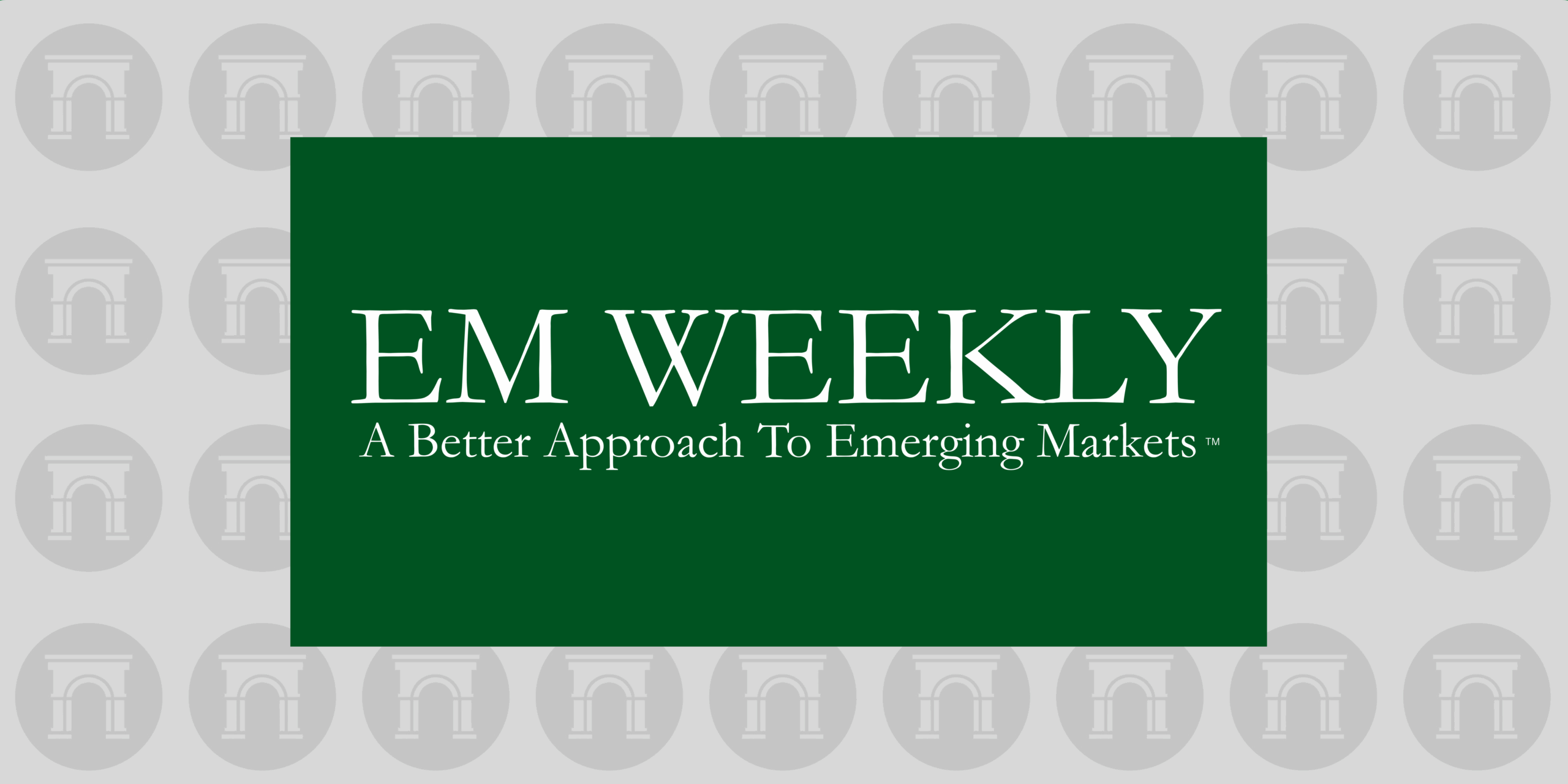Contents
Market Overview
Macro Update
Markets held firm this week, supported by U.S. macro data that reinforced expectations for policy easing without triggering recession fears. August’s inflation data was broadly in line with expectations, with headline CPI rising 0.4% month-over-month and 2.9% year-over-year. More notable was the continued softening in the labor market, as initial jobless claims rose to their highest level in nearly four years. Producer prices also surprised to the downside, with final demand PPI falling 0.1% on the month and rising just 2.6% year-over-year, indicating firms are still hesitant to pass on cost pressures despite elevated tariffs.
These data points pushed markets to price in a more dovish Fed trajectory. A 25bps rate cut at next week’s FOMC meeting is now the overwhelming case, with three total cuts fully priced in by year-end. Given the data, a 50bps cut is likely to be discussed as an option. The S&P 500 reached another record high, while Treasury yields moved lower across the curve. The 10-year UST yield briefly dipped below 4.0%, before finishing the week around 4.05% and the 2s10s spread flattened by 5bps. The dollar weakened, dipping below 98 on the DXY, while gold reached another high, closing around $3,650 per ounce as investors continue to look for inflation hedges.
Oil was volatile, responding to both fundamental and geopolitical catalysts. Prices initially declined on news that OPEC+ plans to increase production into 2026, then spiked following a targeted Israeli strike on Hamas operatives in Doha, Qatar – a rare operation on the territory of a key US ally. While the market quickly digested the event and returned to trading on fundamentals, the strike underscores the potential for regional tensions to re-emerge with little warning. President Donald Trump criticized the operation as “deeply problematic,” signaling unease within the U.S. about the broader strategic implications. By week’s end, oil prices had settled back into the mid-$60s per barrel as attention shifted back to supply dynamics and demand uncertainty.
In Europe, the ECB left rates unchanged and signaled an end to its cutting cycle. ECB President Christine Lagarde described risks to the growth outlook as more balanced and stated that the disinflation process is largely complete. This guidance prompted markets to scale back expectations for further easing. German industrial production and French factory output for July both exceeded expectations, but overall momentum remains subdued amid weak demand and global trade headwinds; UK’s industrial production underperformed.
Political instability added another layer of complexity as French President Emmanuel Macron’s government fell in a confidence vote. President Macron named Sébastien Lecornu as his fifth prime minister in two years, but doubts remain over the government’s ability to advance fiscal consolidation, especially with Marine Le Pen’s National Rally leading in the polls.
In Asia, Japan entered a period of renewed political uncertainty following the resignation of Prime Minister Shigeru Ishiba less than a year into his term. The ruling Liberal Democratic Party will hold leadership elections next month, but policy clarity remains elusive following legislative setbacks. On trade, Mexico proposed a 50% tariff on Chinese auto imports -more than double current levels -in response to pressure from the Trump administration to curb Chinese supply chain exposure. Separately, President Trump urged the EU to impose 100% tariffs on India and China over continued imports of Russian oil.
Other geopolitical developments served as a reminder of latent risks. NATO forces intercepted Russian drones that briefly entered Polish airspace, prompting Warsaw to request an emergency UN Security Council meeting. Markets largely looked through the event, but it was a reminder of the potential for the Ukraine conflict to expand beyond its borders.
As the Fed heads into its September meeting, the market continues to lean into a soft-landing narrative with broadly supportive global conditions. However, the University of Michigan consumer sentiment survey released at the end of the week indicated that U.S. consumer sentiment fell in September to the lowest since May. It also found that long-term inflation expectations rose for the second straight month, as concerns about the labor market and prices weighed on the economic outlook. The figures underscore consumers’ anxiety about employment prospects and personal finances, with consumers also feeling squeezed by the persistence of high prices — a reminder that risks remain and investors should stay vigilant.
EM Credit Update
Emerging Markets (EM) fixed income posted another strong week, buoyed by supportive global risk sentiment. EM hard-currency sovereign debt returned 0.89%, with performance broadly similar across both investment-grade and high-yield segments. Spreads tightened by 7bps at the index level, with high yield tightening more meaningfully, by 12bps vs. 3bps for investment grade.
Regionally, Africa led gains, followed by Latin America and the Middle East, while Asia lagged. On a single-name basis, Lebanon, Egypt, and Colombia were top performers. Lebanon extended its rally amid renewed optimism, bolstered by supportive sell-side commentary and confirmation of an IMF staff visit scheduled for late September. Egypt benefited from improved macro policy sentiment and a generally constructive risk environment. In Colombia, bonds rallied after a well-received liability management operation. In contrast, Argentina underperformed following President Javier Milei’s defeat in the Buenos Aires provincial election, which raised fresh concerns over the durability of his economic reform agenda. Ukraine bonds also came under pressure, as optimism around a near-term end to the war continued to fade.
EM local-currency debt reversed last week’s losses, returning 0.63%. Colombia and Peru led performance in the local space, while the Dominican Republic and Indonesia underperformed, with the latter seeing softer technicals amid shifting rate expectations. Overall, EM local debt continues to be broadly supported in the context of a softer USD environment and increasing expectations about a dovish Fed policy path that is combined with credibility and independence erosion risks.
EM corporates also delivered positive returns, up 0.38%, with performance largely balanced between investment-grade and high-yield issuers. Spreads tightened modestly by 3bps. Ghana was the standout, driven by strong price action in Tullow Oil bonds following reports that the company extended its offtake agreement with Glencore. On the downside, Argentine corporates traded weaker amid broader risk-off sentiment tied to political developments. Longer-dated bonds (10+ year maturities) outperformed, as duration demand picked up ahead of a widely anticipated Fed rate cut.
Primary market activity remained robust, with 21 hard currency deals priced across sovereign and corporate issuers. Sovereign supply was limited to Türkiye and Colombia. Issuance was well balanced between investment-grade and high-yield borrowers. CEEMEA again led regional deal flow, accounting for 43% of total issuance, with the remainder evenly split between Asia and Latin America.
The Week Ahead
All eyes will be on the Federal Reserve’s FOMC meeting where policymakers are expected to cut rates by a quarter point, with an outside chance of a half-point cut given weak jobs data. The Bank of Canada is also expected to cut interest rates by 25bps, while the Bank of England (BoE) is expected to hold at 4.0% after Governor Andrew Bailey signaled cautiousness about rushing into further rate cuts. The Bank of Japan (BoJ) is expected to hold rates at 0.5% amid domestic political uncertainty. Across EM, the central banks in Brazil, Pakistan, Ghana, Indonesia, South Africa and Taiwan will also announce their policy rate decisions. August CPI will be reported in Poland, Saudi Arabia, Canada, Italy, UK, South Africa, Japan and the Euro area and 2Q GDP numbers will be released by Sri Lanka, Israel, Argentina, and New Zealand. Other prominent macro data releases include China’s retail sales, industrial production, and house prices, the Euro area’s industrial production, Germany’s ZEW survey expectations, as well as UK jobless claims and unemployment. In the U.S., markets will see the Empire Manufacturing index, industrial production, business inventories, housing starts, initial jobless claims, and the Leading index, among others, while the August retail sales data will give a read on how President Trump’s tariffs are impacting consumers. On the geopolitical front, Mr. Trump makes a second state visit to the UK and is expected to bring along several Tech CEOs, including Nvidia’s Jensen Huang and OpenAI’s Sam Altman.
Fixed Income
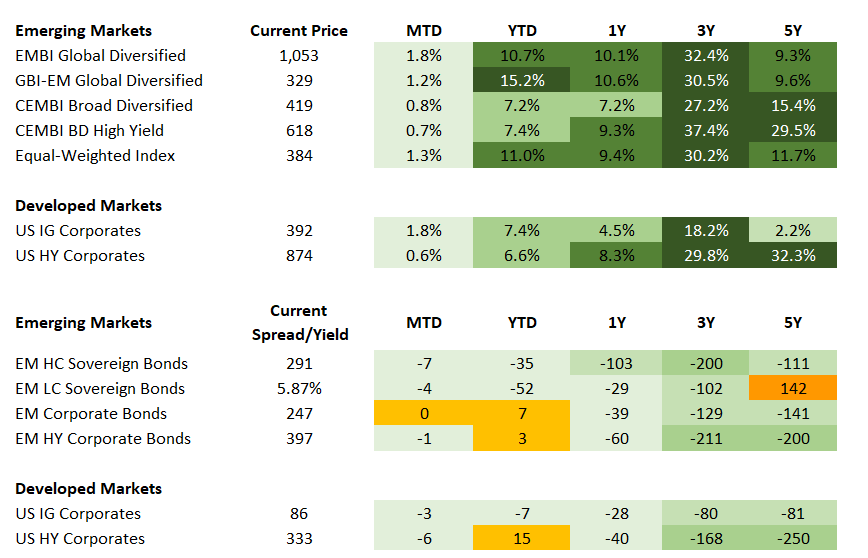
Equities
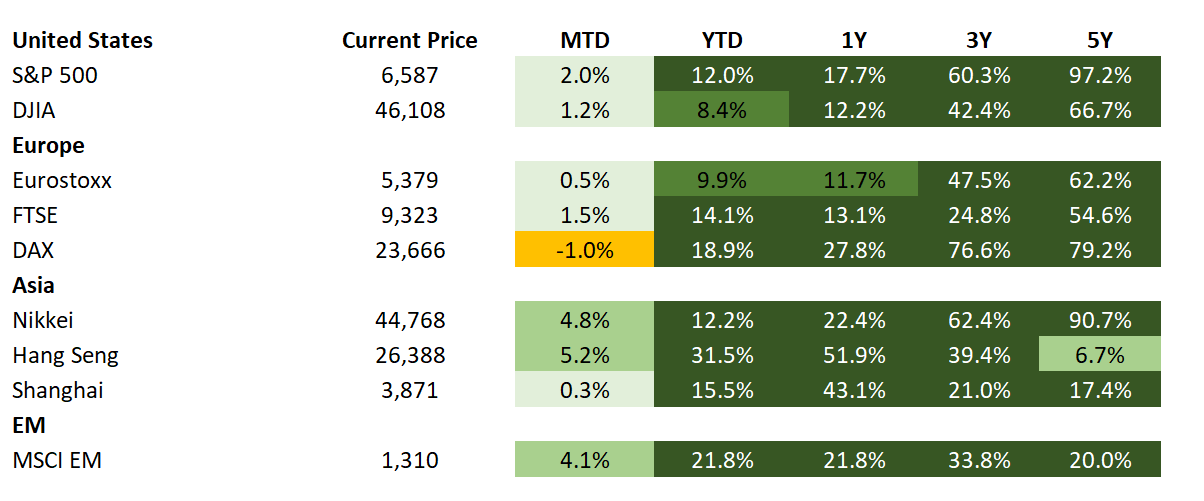
Commodities

Source for data tables: Bloomberg, JPMorgan, Gramercy. EM Fixed Income is represented by the following JPMorgan Indicies: EMBI Global, GBI-EM Global Diversified, CEMBI Broad Diversified and CEMBI Broad High Yield. DM Fixed Income is represented by the JPMorgan JULI Total Return Index and Domestic High Yield Index. Fixed Income, Equity and Commodity data is as of Sept. 12, 2025 (mid-day).
Highlights
Argentina’s Buenos Aires Election Disappoints Markets
Event: Argentine President Milei’s ruling La Libertad Avanza (LLA) party garnered only 33.7% in the mid-term legislative vote in the Province of Buenos Aires last weekend, less than the 47.3% obtained by the opposition Fuerza Patria (FP) coalition. Voter turnout was relatively low at 63% as this was the first time the province’s election was separated from the national mid-term vote, which will take place on October 26th. Sovereigns and the peso faced downward pressure in the immediate aftermath but partially recovered after President Milei’s speech conveyed the need for reflection on the administration’s political approach and reiterated commitment to current economic policy, particularly foreign exchange and monetary frameworks. Additionally, Milei announced the formation of a national political committee with governors and close staffers in an aim to improve political tensions. Later in the week, the IMF reiterated its close communication with the Argentine authorities and the Fund’s support for the country’s commitment to stability, a strong fiscal anchor, and deregulation agenda.
Gramercy Comment: The market anticipated only a roughly five percentage point underperformance for LLA relative to FP, driving the sell-off. President Milei’s commitment to current economic policy and the IMF’s backing are constructive signals – although further macroeconomic policy adjustment and reserve accumulation beyond the elections are needed in order to regain market access in 2026. In the event of a more challenging domestic or external backdrop, the market narrative may shift to the need for a liability management exercise to effectively handle large debt maturities.
The Turkish Central Bank Lowers Policy Rate More Than Expected
Event: Türkiye’s central bank (CBT) cut its key policy rate by 250bps to 40.5%, a more sizable monetary policy easing than the 200bps market consensus expected. Meanwhile, authorities seized dozens of companies, including major media outlets, as part of a probe into an Istanbul-based conglomerate.
Gramercy Comment: These developments come amid ongoing legal proceedings largely seen as a political pressure campaign against the main opposition party CHP, including the takeover of its Istanbul operation by a court-appointed administrator. In this context, we anticipate a continued, two-pronged approach by President Recep Tayyip Erdogan to consolidate power ahead of elections, which are expected in 2027 or 2028. On one hand, political and/or legal pressure on prominent opposition figures and organizations is likely to persist. On the other, the credit-positive broad macroeconomic rebalancing and stabilization spearheaded by financial minister Mehmet Simsek’s economic team and the CBT is likely to continue to enjoy the president’s support, given that a stronger macro framework will be critically important ahead of the next election. Against this backdrop, CBT’s decision to lower the interest rate by 250bps should be seen as a fine balancing act between financial market demands for deflation in the economy and the business community’s lobbying for faster monetary policy easing.
From a market perspective, sentiment on Turkish assets in coming months will depend largely on finding the correct balance between these competing priorities while also reassuring investors that macro rebalancing remains on track regardless of the political and judicial noise.
Brazil’s Supreme Court Finds Former President Bolsonaro Guilty of Coup Attempt
Event: A majority of judges on a Brazil Supreme Court panel found former President Jair Bolsonaro guilty of attempting a coup after his 2022 election defeat, making him the country’s first former leader convicted of such a crime.
Gramercy Comment: The legal ruling carries significant implications from a market perspective, both in terms of domestic and foreign affairs. It has the potential and influence to shape the 2026 election landscape, the key market driver on the horizon. An important nuance within Mr. Bolsonaro’s guilty verdict is found in a dissenting opinion, which could open the door to a legal path for the court to potentially accept a presidential pardon (or overturn Mr. Bolsonaro’s conviction) if a right-wing opposition candidate wins the presidency in 2026. This is likely to strengthen Sao Paulo Governor Tarcisio de Freitas’s bid to secure Mr. Bolsonaro’s endorsement as the opposition’s presidential candidate, which would be a welcome development from a market perspective. Such a tailwind for Brazilian assets could be offset to some extent by growing tensions between Brasilia and Washington, given that Mr. Bolsonaro’s criminal conviction is likely to trigger additional pressure by the Trump administration. The administration has already partly justified steep tariffs against Brazilian imports by pointing to Mr. Bolsonaro’s legal troubles.
Indonesia Replaces Finance Minister and Pledges New Economic Support
Event: In the wake of recent protests, President Prabowo Subianto replaced his long-time finance minister, Sri Mulyani Indrawati, with Purbaya Yudhi Sadewa, a trained economist who held former positions at Danareska Research Institute and as the Head of Indonesia’s Insurance Deposit Agency. Mr. Purbaya has emphasized a growth-oriented policy with a plan to boost domestic liquidity by roughly $12 billion, maintain fiscal health with optimization of the existing fiscal framework, and amend the draft 2026 budget. The currency depreciated slightly over the week.
Gramercy Comment: Mr. Purbaya is a largely unknown figure to markets compared to well-known former minister Mulyani. Given Indonesia’s relatively solid fiscal position and low debt burden, investors are likely to adopt a wait and see approach. We expect further fiscal spending but that the deficit will remain within the 3% of GDP cap based on Mr. Purbaya’s comments thus far. Investors and rating agencies will likely monitor for off-balance sheet spending through the new sovereign wealth fund, Danantara, or through other mechanisms, that could challenge the credit profile over the medium term. We expect the central bank to remain on hold at next week’s meeting but see room for further rate cuts later this year – assuming limited pressure on the rupiah.
Emerging Markets Technicals
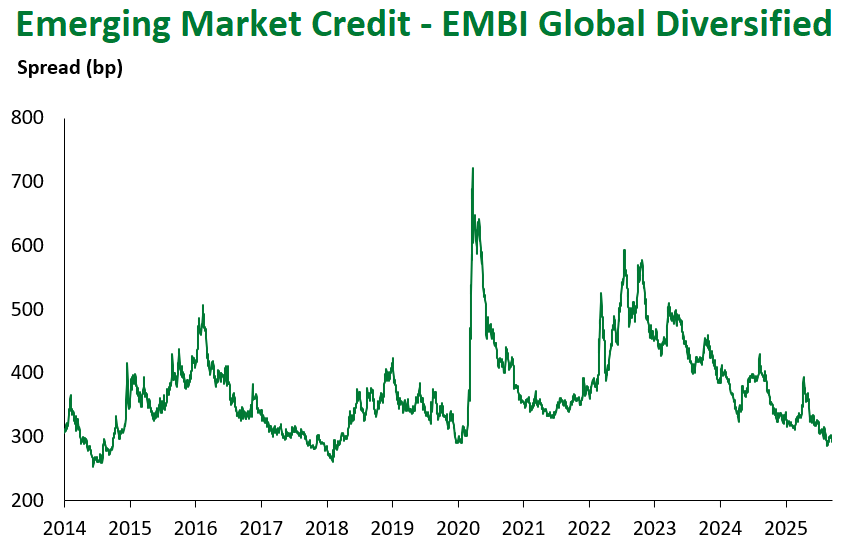
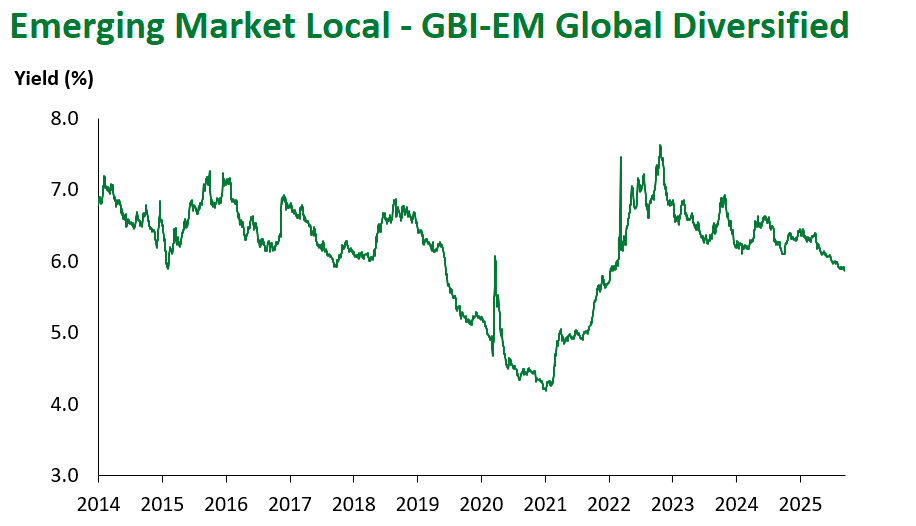
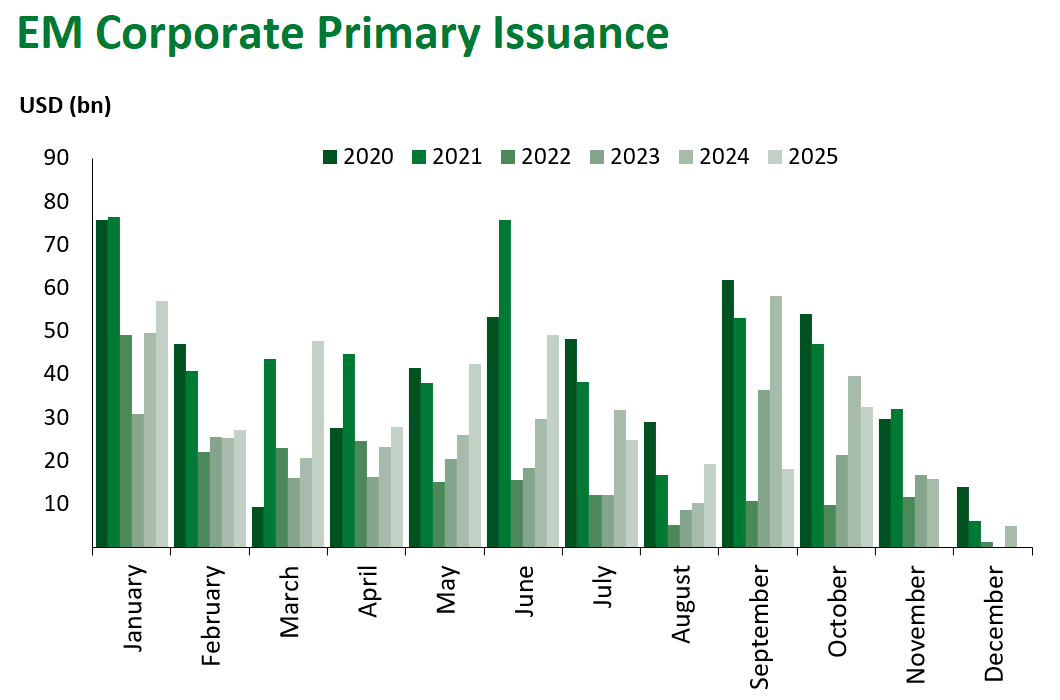
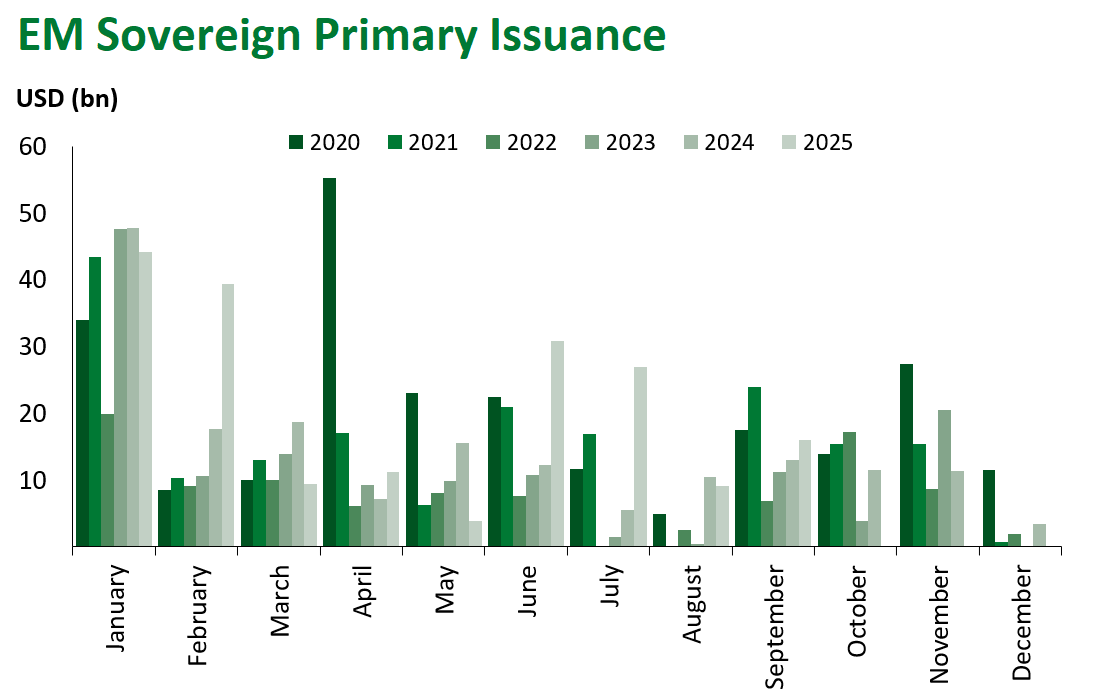
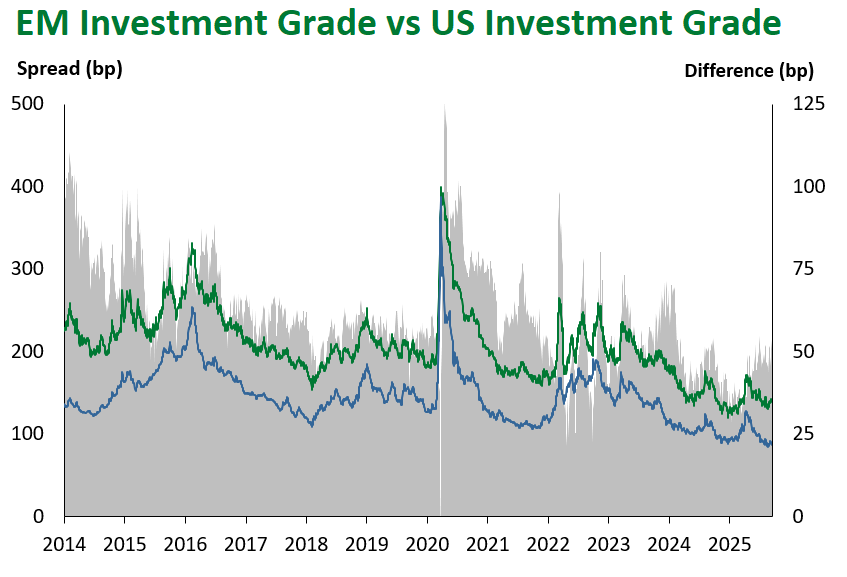
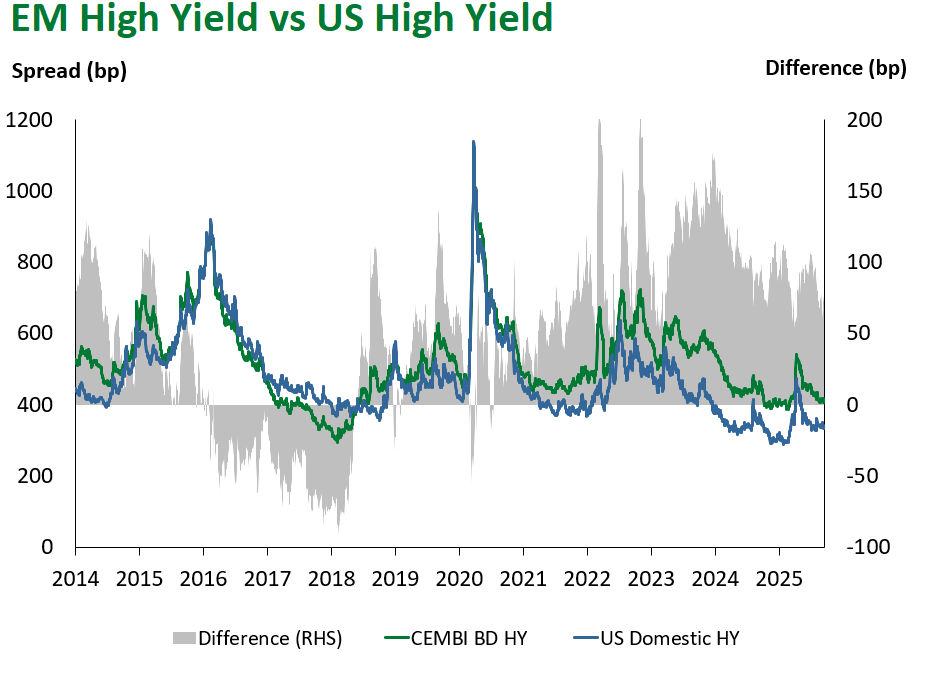
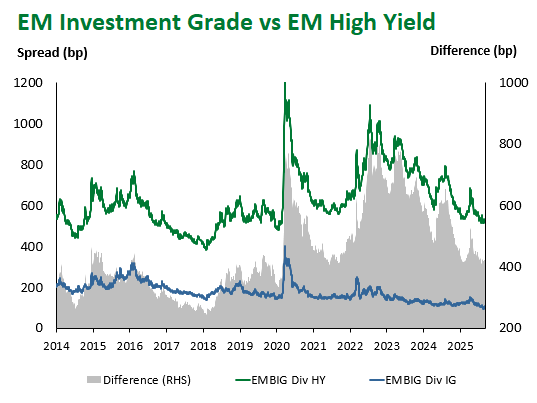
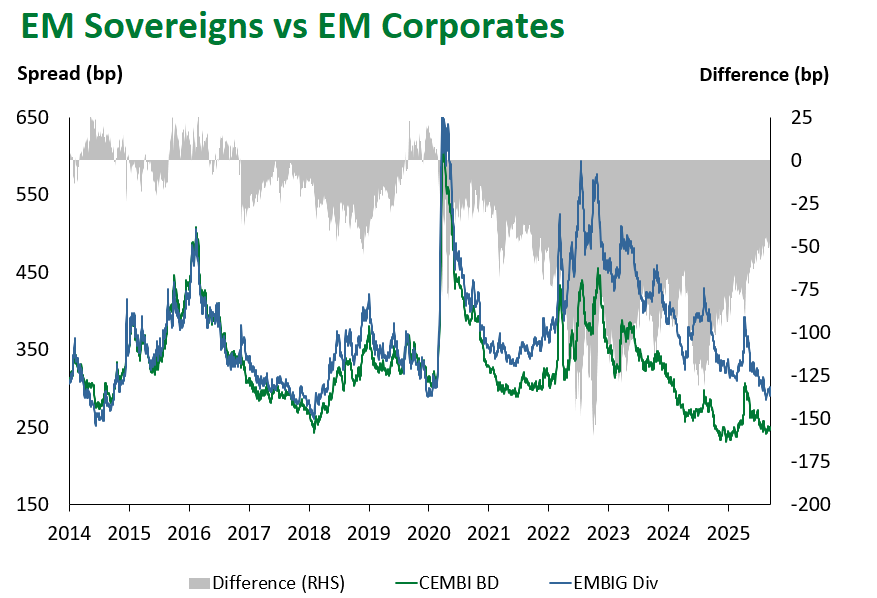
Emerging Markets Flows

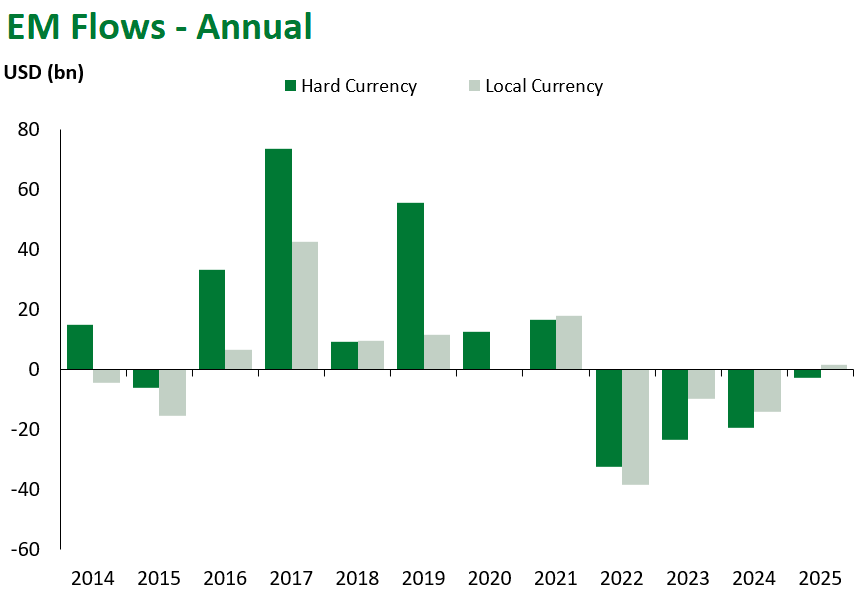
Source for graphs: Bloomberg, JPMorgan, Gramercy. As of Sept. 12, 2025.
For questions, please contact:
Kathryn Exum, CFA ESG, Director, Co-Head of Sovereign Research, [email protected]
Petar Atanasov, Director, Co-Head of Sovereign Research, [email protected]
This document is for informational purposes only. The information presented is not intended to be relied upon as a forecast, research or investment advice, and is not a recommendation, offer or solicitation to buy or sell any securities or to adopt any investment strategy. Gramercy may have current investment positions in the securities or sovereigns mentioned above. The information and opinions contained in this paper are as of the date of initial publication, derived from proprietary and nonproprietary sources deemed by Gramercy to be reliable, are not necessarily all-inclusive and are not guaranteed as to accuracy. This paper may contain “forward-looking” information that is not purely historical in nature. Such information may include, among other things, projections and forecasts. There is no guarantee that any forecasts made will come to pass. Reliance upon information in this paper is at the sole discretion of the reader. You should not rely on this presentation as the basis upon which to make an investment decision. Investment involves risk. There can be no assurance that investment objectives will be achieved. Investors must be prepared to bear the risk of a total loss of their investment. These risks are often heightened for investments in emerging/developing markets or smaller capital markets. International investing involves risks, including risks related to foreign currency, limited liquidity, less government regulation, and the possibility of substantial volatility due to adverse political, economic or other developments. References to any indices are for informational and general comparative purposes only. The performance data of various indices mentioned in this update are updated and released on a periodic basis before finalization. The performance data of various indices presented herein was current as of the date of the presentation. Please refer to data returns of the separate indices if you desire additional or updated information. Indices are unmanaged, and their performance results do not reflect the impact of fees, expenses, or taxes that may be incurred through an investment with Gramercy. Returns for indices assume dividend reinvestment. An investment cannot be made directly in an index. Accordingly, comparing results shown to those of such indices may be of limited use. The information provided herein is neither tax nor legal advice. Investors should speak to their tax professional for specific information regarding their tax situation.
